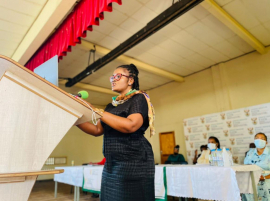Dr. Nobuhle Nkabane Advocates for University Campus Land Use to Address Student Accommodation Shortage
The facility, set to accommodate 200 female students starting in 2025, is part of a broader initiative aimed at addressing student housing issues that directly affect academic performance and overall student well-being.

- Country:
- South Africa
Dr. Nobuhle Nkabane, South Africa's Minister of Higher Education and Training, has urged higher education institutions to dedicate more land on campus for the development of student accommodation facilities. This initiative is aimed at enhancing the quality and safety of student living conditions while alleviating the significant housing challenges faced by students.
In her address at the unveiling of a new 200-bed student accommodation facility at the Tshwane University of Technology (TUT) eMalahleni campus on Monday, Nkabane stressed the importance of creating a conducive and secure environment for students. She highlighted that universities are responsible for nurturing a capable workforce that will ultimately contribute to the country’s economic growth and development, aligning with the vision of a capable, ethical, and developmental State.
Addressing the Student Accommodation Crisis
The new student accommodation project, funded by the Department of Higher Education and Training (DHET) with R110 million from the department’s infrastructure grants and R8.298 million from TUT, represents a significant step in tackling the student accommodation shortage. The facility, set to accommodate 200 female students starting in 2025, is part of a broader initiative aimed at addressing student housing issues that directly affect academic performance and overall student well-being.
Minister Nkabane acknowledged that student accommodation remains a major challenge within the higher education sector, disproportionately affecting historically disadvantaged students who often cannot afford quality, affordable housing. The minister pointed out that inadequate housing impacts not only student safety but also their ability to focus on academics, which in turn affects the quality of graduates produced by South African universities.
Student Housing Infrastructure Programme Phase 2
As part of a long-term solution, Minister Nkabane announced that TUT is included in the Student Housing Infrastructure Programme Phase 2, aimed at building an additional 3,500 beds across TUT campuses from 2024 to 2027. The eMalahleni campus will receive 500 new bed spaces as part of this phase. The initiative is designed to help universities develop the infrastructure necessary to meet the growing demand for student accommodation.
The funding for this phase includes R450.5 million from DHET’s Infrastructure and Efficiency Grant (IEG), along with R337.882 million from the National Treasury’s Budget Facility for Infrastructure (BFI). The remaining funds will be raised through debt financing from the Development Bank of Southern Africa (DBSA).
Fighting Corruption and Ensuring Timely Completion
Minister Nkabane emphasized that the department would not tolerate delays in the completion of these vital infrastructure projects. She underscored the importance of strict monitoring and accountability, warning that any corrupt practices or delays would be met with severe consequences. She urged all students to play an active role in protecting and preserving the new infrastructure being built for their benefit.
Support for Vocational Training: Nkangala College’s Role
The Minister’s visit also included a stop at the Nkangala Technical Vocational Education and Training (TVET) College’s Middleburg campus. This institution, in partnership with the National Student Financial Aid Scheme (NSFAS), serves as a crucial part of the government's strategy to boost the number of qualified artisans in South Africa. The Top of the World Training Centre, purchased by the college in 2015, has been central to this mission. Originally accredited for just three trades, the centre has now expanded its offerings, gaining accreditation for six new occupational programs: fitter and turner, millwright, mechanical fitter, boilermaker, welder, and electrician.
This expansion has increased the training capacity from 60 to 90 apprentices, and the centre now accommodates 90 apprenticeship students and 90 students through the Artisan Recognition of Prior Learning program. To date, the centre has trained over 1,300 artisans, contributing to the nation’s goal of producing 30,000 artisans annually to address critical skills shortages in various industries.
Dr. Nkabane’s visit highlighted the government’s commitment to addressing both the immediate and long-term challenges facing South Africa’s higher education system, particularly in terms of student accommodation and vocational training. By investing in infrastructure and providing accessible, affordable housing, the government aims to create an environment conducive to learning and development, ultimately strengthening the nation’s economy and ensuring a sustainable future for all students.
- READ MORE ON:
- Dr. Nobuhle Nkabane










